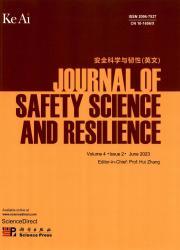航空安全中人为因素研究的演变:知识结构的系统回顾与文献计量学分析
IF 3.4
Q1 PUBLIC, ENVIRONMENTAL & OCCUPATIONAL HEALTH
引用次数: 0
摘要
尽管大量的研究努力致力于人为因素(HF)在航空安全,一个全面的审查仍然明显缺乏。因此,本研究首次对高频在提高航空运输的安全性和可靠性方面所起的重要作用进行了深入的系统回顾和文献计量分析。采用系统评价和荟萃分析的首选报告项目(PRISMA)指南,我们仔细检查了1937年至2023年底的Scopus数据集。采用严格的筛选过程来确定相关文件,最终对1663份文件进行批判性分析,以解决HF中与航空安全相关的四个基础研究问题。首先,我们的分析深入探讨了自1937年以来航空业HF特征的关键重点领域。通过追踪研究的轨迹,本研究旨在了解航空环境下高频的演变。此外,重点探讨了对研究至关重要的主要挑战和知识差距,并提出了未来调查的途径,以最大限度地提高其对航空运输安全的影响。最后,该研究扩展了其调查,以比较航空部门与核电站(NPPs)和化学过程工业(CPI)的现有人力可靠性研究格局。这种理解高频的整体方法不仅为航空安全提供了有价值的见解,而且还将这些发现置于更广泛的工业框架中,揭示了航空工业中人类可靠性存在的关键差距。这项研究的结果强调了HF在建立和推进更安全、更有弹性的航空运输系统方面不可或缺的作用。本文章由计算机程序翻译,如有差异,请以英文原文为准。
Evolution of human factors research in aviation safety: A systematic review and bibliometric analysis of the intellectual structure
Despite the multitude of research endeavors dedicated to Human Factors (HF) in aviation safety, a comprehensive review remains conspicuously scarce. Accordingly, this study presents the first in-depth systematic review and bibliometric analysis of the vital role played by HF in enhancing the safety and reliability of air transportation. Employing the Preferred Reporting Items for Systematic Reviews and Meta-Analyses (PRISMA) guideline, we scrutinized the Scopus dataset spanning from 1937 to late 2023. A rigorous screening process was applied to identify relevant documents, ultimately subjecting critical analyses of 1663 documents to address four foundational research questions within HF associated with aviation safety. First, our analysis delves into the identification of key areas of emphasis that have characterized HF in the aviation industry since 1937. By tracing the trajectory of research over time, the study aims to discern the evolution of HF within the aviation context. Furthermore, an exploration of primary challenges and knowledge gaps crucial to research is highlighted, with proposed pathways for future investigations to maximize their impact on air transportation safety. Finally, the study extends its inquiry to compare the existing landscape of human reliability research within the aviation sector with that of Nuclear Power Plants (NPPs) and the Chemical Process Industry (CPI). This holistic approach to understanding HF not only contributes valuable insights into aviation safety but also contextualizes these findings within broader industrial frameworks, revealing the key gaps that exist in human reliability within the aviation industry. The outcomes of this study underscore the indispensable role of HF in establishing and advancing safer and more resilient air transportation systems.
求助全文
通过发布文献求助,成功后即可免费获取论文全文。
去求助
来源期刊

安全科学与韧性(英文)
Management Science and Operations Research, Safety, Risk, Reliability and Quality, Safety Research
CiteScore
8.70
自引率
0.00%
发文量
0
审稿时长
72 days
 求助内容:
求助内容: 应助结果提醒方式:
应助结果提醒方式:


